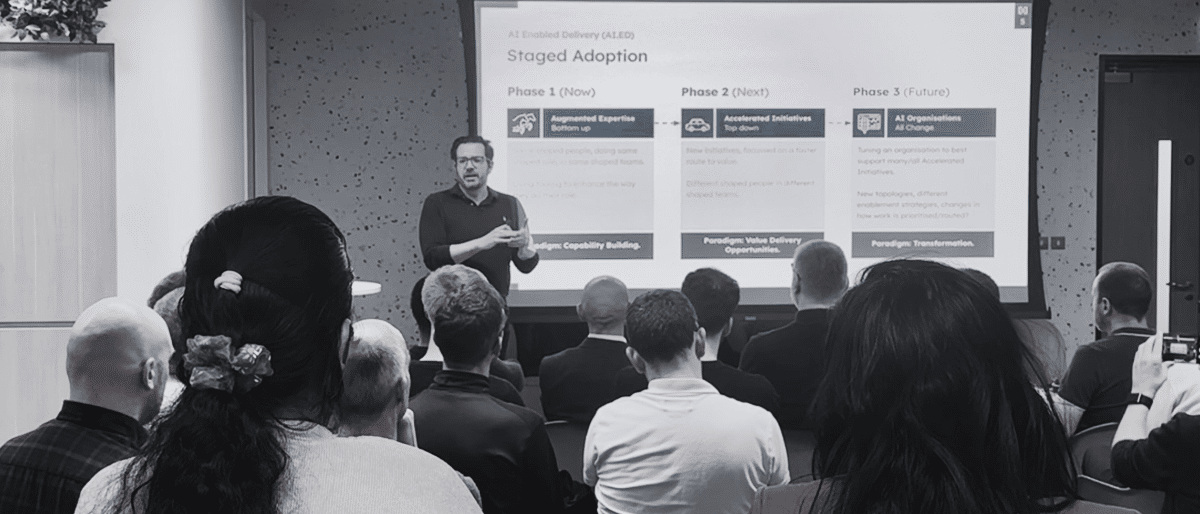(… but maybe this just means the newborn is now approaching toddler years!)
Back in March, we shared insights from 50 technology leaders about how AI was beginning to shape software delivery. At that point, most organisations were still in the early stages – experimenting, testing tools, and getting comfortable with what was possible.
Over the last few weeks, through conversations at World Summit AI, my talk at AI for the Rest of Us, and several Equal Experts roundtables + ExpertTalks events in Munich and London, we’ve been able to reconnect with some of the same people and communities – and many more new folk.
The tone has subtly shifted.
People are no longer asking whether AI can play a role in delivery – they’re now wrestling with how to adopt it responsibly, and what it really takes to make it scale. There’s a sense that things are moving quickly outside, but within large organisations, progress remains more careful and pragmatic (and sometimes frustratingly slow).
Below are some of the recurring themes we heard – from across sectors, roles, and regions.
1. From pilots to adoption: The human challenge
The headline change is that teams are moving on from pilots to thinking seriously about adoption at scale.
That means the focus has shifted from tools to people. Several discussions – particularly at World Summit AI and our Munich AI events – touched on the reality that most delivery teams now have some exposure to AI-assisted development, but real transformation depends on organisational behaviour, not individual enthusiasm.
Leaders are asking:
- How do we help teams absorb faster cycles of delivery?
- How do we avoid creating isolated examples of success?
- How do we make AI part of the culture, not just the workflow?
It’s not about replacing expertise, but amplifying it. And like any amplifier, it makes both the good and the bad louder.
While many teams are progressing towards adoption, we also see a widening readiness gap: organisations still seeking guidance on where to start or lacking internal capability to move from experiments to execution. This early-stage uncertainty often reflects the same human challenges seen later at scale: capability, culture, and confidence.
Increasingly, the conversation is turning towards capability building — not just adopting new tools, but developing the skills, patterns, and mindsets needed to use them effectively. It’s this focused capability development that will determine which organisations turn AI potential into lasting performance.
2. The big ROI question
A consistent topic was the challenge of measuring ROI. Many organisations have invested heavily in tools like Copilot and ChatGPT Enterprise to empower teams and encourage experimentation, and while these offer valuable learning opportunities, leaders admit they’re struggling to quantify the real impact.
Leaders also spoke about reframing ROI — moving beyond cost savings towards measuring value creation: higher productivity, faster innovation, and the ability to scale outcomes without proportionate increases in headcount.
As next year’s budget cycles approach, the question of ROI is becoming unavoidable. Enthusiasm remains high, but measurable results are proving harder to find.
Until then, there’s a risk of fatigue: enthusiasm is high, results are harder to measure.
3. Responsibility and realism remain central
Across all the events, the tone around responsibility was strikingly consistent.
People are clear that AI doesn’t change accountability for code quality, security, or ethical choices. One participant in Munich phrased it simply: “You can’t blame the AI if you ship bad code.”
The healthiest discussions treated AI as a powerful amplifier – not an autonomous agent. It can boost productivity and creativity, but it can also accelerate poor practices if used uncritically.
Some are now formalising these responsibilities through bias mitigation reviews and ethical governance frameworks — recognising that sustainable adoption also depends on trust and transparency in how AI is used.
That realism is a welcome evolution. The conversation has matured from “What can this do?” to “How does it make us better?”
4. A business conversation beyond engineering teams
AI in software delivery is no longer confined to engineering teams. At the Munich roundtable, for example, product, compliance, and operations leaders were actively debating how AI changes their own roles.
Several participants noted that fragmented, department-led AI experiments risk creating siloes of capability. The organisations seeing the most progress are those breaking down these barriers — connecting delivery, product, and compliance teams around shared AI principles and data foundations.
The challenge isn’t just technical, but organisational. Businesses need to absorb faster delivery cycles, evolve decision-making structures, and learn how to experiment safely.
The most thoughtful organisations are already treating AI adoption as a business transformation topic, not a technology initiative.
5. A maturing perspective is emerging
What’s emerging overall is a more balanced, experience-driven understanding of AI in delivery.
The excitement remains, but it’s grounded in practical realities: governance, ROI, adoption, and the enduring importance of good engineering. The consensus seems to be that AI is here to stay – but success depends less on what the models can do, and more on how well we, as organisations, learn to use them.
A related shift is the rise of structured capability building. Leaders are investing in enablement roles, targeted upskilling, and boot-camp-style programmes — particularly in public sector and regulated contexts — to build the confidence and skills needed for sustainable adoption. We strongly believe that this is one part of the puzzle – but must be combined with concrete value delivery (“capability building through doing”).
At Equal Experts, that’s where our focus continues to be: helping teams move from exploration to adoption, and from enthusiasm to measurable, sustainable impact.
As one participant put it: “The best practices and the talent war in software development still apply – with or without AI.”
We couldn’t agree more.




